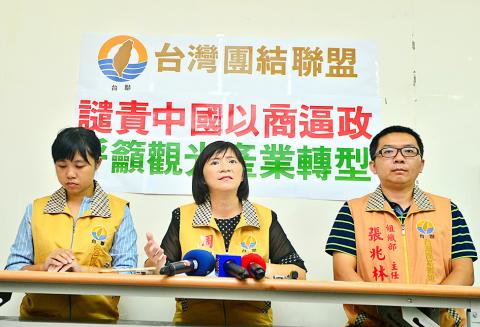Taiwan Solidarity Union (TSU) members yesterday condemned China for manipulating the tourism market in a bid to coerce Taiwan ahead of a planned protest by travel operators today, saying the tourism industry needs to reform and break away from overdependence on China.
China has restricted tourism to Taiwan as the Democratic Progressive Party (DPP) administration refuses to accept the so-called “1992 consensus,” which is part of China’s attempt to annex Taiwan by economic coercion, TSU Youth Department deputy director Hsu Ya-chi (許亞齊) said.
The “1992 consensus,” a term former Mainland Affairs Council chairman Su Chi (蘇起) admitted making up in 2000, refers to a tacit understanding between the Chinese Nationalist Party (KMT) and the Chinese government that both sides of the Taiwan Strait acknowledge there is “one China,” with each side having its own interpretation of what “China” means.

Photo: Wang Yi-sung, Taipei Times
“Taiwan’s tourism industry, as well as other industries, has to diversify its client base and seek international customers to escape overreliance on the Chinese market and hostile political manipulation,” Hsu said.
Former president Ma Ying-jeou’s (馬英九) China-friendly administration focused the nation’s economy on the Chinese market, and the tourism industry has ended up in a vicious cycle of depleting limited tourism resources to court low-spending Chinese tourist groups, former TSU legislator Chou Ni-an (周倪安) said.
The number of inbound tourists has grown by about 1 million every year and it reached 10 million last year, while Chinese tourists increased from 22.95 percent of all foreign travelers in 2008 to 53.23 percent last year, Chou said.
However, the average daily consumption per tourist has dropped alongside the increase in Chinese tourists, going down from US$224.07 in 2013 to US$207.87 last year.
“Far from benefiting from increased Chinese tourist numbers, the nation is entrenched in a tourism pattern that offers low-quality and low-profit package tours to Chinese visitors,” Chou said.
Travel agencies funded with Chinese capital that provide one-stop services should be barred from receiving relief loans from the Executive Yuan, she said.
The Executive Yuan on Thursday last week approved a plan to extend NT$30 billion (US$948.45 million) in loans to the tourism sector amid the drastic decrease in the number of Chinese tourists visiting Taiwan.
Tourism has to be developed in line with national security, environmental capacity and service quality to prevent a flood of low-quality tour groups overwhelming the nation’s capacity, she said.
“The Chinese Communist Party (CCP) has threatened to cease all interaction with Taiwan if the DPP administration does not accept the ‘1992 consensus.’ For the first time the TSU supports the CCP. We called on the CCP to keep its word and cease the interaction as soon as possible,” TSU youth director Chang Chao-lin (張兆林) said.
“What the nation needs least is Chinese tourists being used to manipulate Taiwan’s economy and independence,” Chang said, in response to Minister Without Portfolio Chang Ching-sen’s (張景森) remark that Chinese visitors are Taiwan’s “most needed friends.”
Although travel firms are understandably distressed, they have to transform their business models to become more sustainable and profitable to prevent being paralyzed by Chinese manipulation, Chang said.

PREPAREDNESS: Given the difficulty of importing ammunition during wartime, the Ministry of National Defense said it would prioritize ‘coproduction’ partnerships A newly formed unit of the Marine Corps tasked with land-based security operations has recently replaced its aging, domestically produced rifles with more advanced, US-made M4A1 rifles, a source said yesterday. The unnamed source familiar with the matter said the First Security Battalion of the Marine Corps’ Air Defense and Base Guard Group has replaced its older T65K2 rifles, which have been in service since the late 1980s, with the newly received M4A1s. The source did not say exactly when the upgrade took place or how many M4A1s were issued to the battalion. The confirmation came after Chinese-language media reported

A Ministry of Foreign Affairs official yesterday said that a delegation that visited China for an APEC meeting did not receive any kind of treatment that downgraded Taiwan’s sovereignty. Department of International Organizations Director-General Jonathan Sun (孫儉元) said that he and a group of ministry officials visited Shenzhen, China, to attend the APEC Informal Senior Officials’ Meeting last month. The trip went “smoothly and safely” for all Taiwanese delegates, as the Chinese side arranged the trip in accordance with long-standing practices, Sun said at the ministry’s weekly briefing. The Taiwanese group did not encounter any political suppression, he said. Sun made the remarks when

The Taiwanese passport ranked 33rd in a global listing of passports by convenience this month, rising three places from last month’s ranking, but matching its position in January last year. The Henley Passport Index, an international ranking of passports by the number of designations its holder can travel to without a visa, showed that the Taiwan passport enables holders to travel to 139 countries and territories without a visa. Singapore’s passport was ranked the most powerful with visa-free access to 192 destinations out of 227, according to the index published on Tuesday by UK-based migration investment consultancy firm Henley and Partners. Japan’s and

BROAD AGREEMENT: The two are nearing a trade deal to reduce Taiwan’s tariff to 15% and a commitment for TSMC to build five more fabs, a ‘New York Times’ report said Taiwan and the US have reached a broad consensus on a trade deal, the Executive Yuan’s Office of Trade Negotiations said yesterday, after a report said that Washington is set to reduce Taiwan’s tariff rate to 15 percent. The New York Times on Monday reported that the two nations are nearing a trade deal to reduce Taiwan’s tariff rate to 15 percent and commit Taiwan Semiconductor Manufacturing Co (TSMC, 台積電) to building at least five more facilities in the US. “The agreement, which has been under negotiation for months, is being legally scrubbed and could be announced this month,” the paper said,